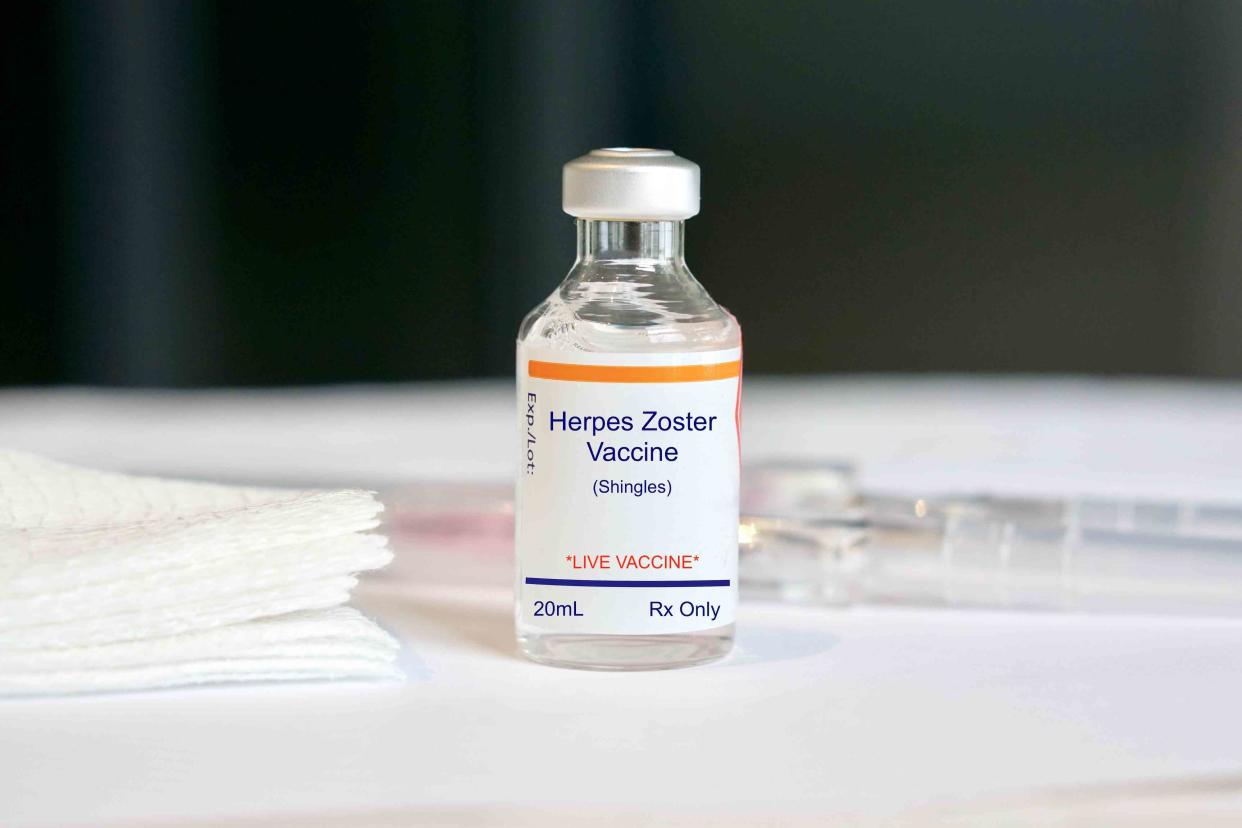Getting a Shingles Shot May Benefit Your Heart and Brain

Fact checked by Nick Blackmer
Key Takeaways
New research shows that the shingles vaccine can reduce the chance of heart attack and stroke from the viral infection.
The shot can lower the risk of such adverse events by as much as 50% in the first 42 days after illness—the “at-risk” period for heart attack and stroke.
Experts say the shingles vaccine is an important tool in helping keep older adults protected.
Getting a shingles vaccine may do more than just prevent you from getting the illness. New research out of Victoria University of Wellington in New Zealand found that getting the shingles shot can reduce the risk of stroke and heart attack from the viral infection.
The findings, published in journal Nature Communications, followed the health outcomes of nearly 280,000 participants—mostly aged 70 and older—who rolled up their sleeves for the vaccine. The researchers found that those who had received the shingles vaccine had lower rates of heart attack and stroke from the viral infection compared to those who were unvaccinated.
Shingles is a viral infection caused by the reactivation of the varicella zoster virus—the same virus that causes chickenpox. The infection causes a painful rash that develops on one side of the body.
Related: What Shingles Looks Like
What’s more, the infection is associated with an increased risk of having a stroke or heart attack in the first month after the varicella zoster virus is reactivated. The researchers wrote that the risk of stroke is up to two to three times higher if the virus reoccurs in the ophthalmic nerve.
The vaccine, researchers found, may reduce the risk of stroke and heart attack by as much as 50% in the first 42 days after contracting shingles—the “at-risk” period for such events.
“If the vaccine is effective against shingles, it means that indirectly, it protects against stroke and myocardial infarction,” James Mbinta, MD, MPH, a research fellow at the School of Health at Victoria University of Wellington and co-author of the research, told Verywell.
Why Shingles Is Associated With Heart Attack and Stroke
Alon Gitig, MD, the director of cardiology for Mount Sinai Doctors Westchester, told Verywell that while it is unknown exactly why shingles is associated with heart attack and stroke, inflammation might have something to do with it.
He said that any acute illness, like shingles, can create a heightened inflammatory state in the body. And if that inflammation triggers inflammation within the walls of arteries, it can lead to destabilizing existing plaques and result in clotting.
Takeaway
A heart attack happens when the flow of blood that brings oxygen to the heart muscle becomes blocked. In most cases, it occurs when an atherosclerotic plaque—a build-up of lipids and other substances in the artery—in the wall of a coronary artery breaks off and causes a blood clot to form, blocking an artery in the heart muscle.
While strokes can occur in different ways, the most common is an ischemic stroke. This is when a blood clot travels to the brain and interrupts blood flow and deprives the brain of oxygen.
“It is possible that preventing shingles with vaccination protects the arterial system by avoiding inflammation overload that is triggered in some people by the illness,” Gitig said. “Another possibility is that the [shingles] virus has potential to directly invade arteries and create local adverse changes there, which can lead to plaque destabilization.”
Gitig said the varicella zoster virus likely travels into artery walls via nerve fibers. If viral reactivation can be prevented in the nerves with a vaccine, it can potentially be kept from spreading to vascular tissue.
Research shows that having shingles is associated with an increased chance of heart attack or stroke, making vaccination important.
One 2022 study out of Brigham and Women’s Hospital found that shingles is associated with an almost 30% higher long-term risk of a major cardiovascular event such a stroke or heart attack. Researchers also found that the elevated risk could persist for 12 years or more after having the infection.
“Given the growing number of Americans at risk for this painful and often disabling disease and the availability of an effective vaccine, shingles vaccination could provide a valuable opportunity to reduce the burden of shingles and reduce the risk of subsequent cardiovascular complications,” Sharon Curhan, MD, ScM, a physician and epidemiologist in the Channing Division of Network Medicine at Brigham and Women’s Hospital, said in a statement about the study last year.
Related: What Does Shingles Feel Like?
Who Is the Shingles Vaccine For?
The CDC recommends that patients 50 and older get two doses of the vaccine, called Shingrix, to prevent shingles and related complications. The main contraindications for the recombinant shingles vaccine is a history of anaphylactic reaction to the vaccine’s ingredients, Gitig said.
Mbinta said the shot is safe for someone with a history of heart disease and stroke.
“The vaccine is effective even for those with heart disease, those with kidney disease, those with obstructive pulmonary disease and people with stroke,” he said. “So even for those who have had a stroke, taking the vaccine is helpful.”
Gitig echoed this and said there are no current known reasons to skip the shingles shot based on prior cardiovascular diseases.
“If the findings in the present study are replicated in additional research, then there would be a compelling argument for shingles vaccination in these patients, to prevent future heart attack or stroke,” he said.
What This Means For You
Getting the shingles vaccine can help reduce the chance of heart attack or stroke from the virus, research shows. Experts say that even for people with a history of such events, getting vaccinated is important and can help prevent adverse health outcomes.
Read the original article on Verywell Health.

